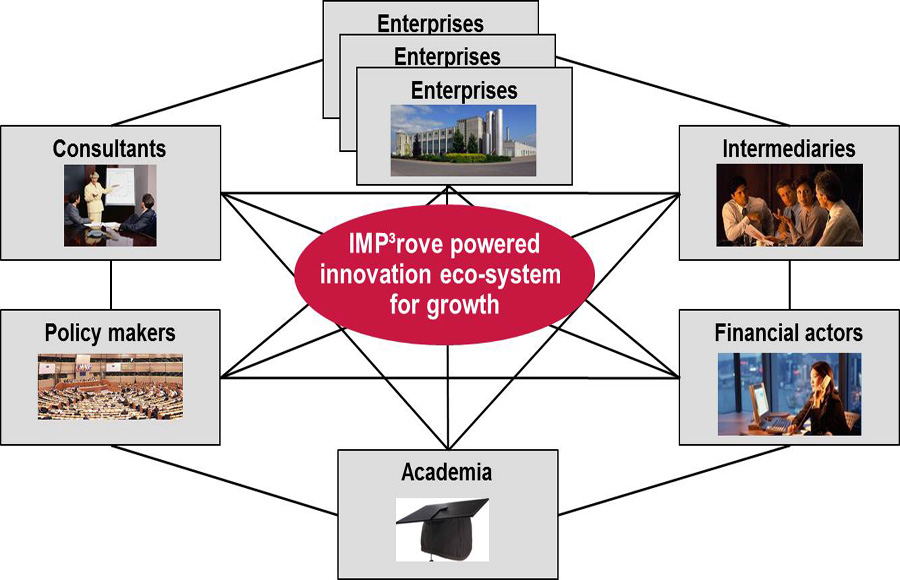By: Ewa Ali / Isabella M. Grahsl / Margarita Korockina
Innovation policy is about the challenge of contributing to the wide objectives such as employment, sustainability and economic growth. How to approach such a task? The answer is simple but the effort complex: Aim for a strong innovation eco-system. Referring to the case of the IMP³rove Euromed Project the article suggests four systematic steps on how to establish an effective, innovation inducing eco-system.
Innovation is essential for a long-term competitive advantage. Therefore public programmes, the goal of which is to raise the competitiveness of local firms, also aim at creating an innovation- triggering effect. Those public innovation programmes require careful planning and the development of a wide yet coherent eco-system with very divers players included. Only then, the companies, especially small and medium-sized enterprises (SMEs) can be mobilized to actively participate in and benefit from the innovation programs.
For this reason, the European Commission, launched the “Euromed – Innovative Entrepreneurs for Change” project in the South Mediterranean countries including Egypt, Lebanon, Morocco, and Tunisia building on the results that the IMP³rove initiative has generated in Europe. The focus is to strengthen the innovation management support services to potential high growth enterprises in the four countries. That approach is expected to have a long term impact on accelerating competitiveness, jobs creation, growth prospects, and wider wealth participation in the region.
IMP³rove – Euromed project
In August 2012, the European Commission, with support of local partners, launched the project “Euromed – Innovative Entrepreneurs for Change”. IMP³rove plays an integral part. The focus of the IMP³rove Academy is to traONLY if you would like changensfer knowledge in innovation management to local support providers – building on a proven approach – and to ensure the practical application of this newly acquired knowledge at local SMEs. By using a single, holistic approach, the interactions between the various support providers and the SMEs were facilitated. Thus a common national approach is developed.
IMP³rove-powered Innovation Eco-System for growth
In order to develop this common approach different actors are needed:
- SMEs
- Management consultants
- Intermediaries
- Academia
- Financial actors
- Policy makers
Each actor plays an important and complimentary role in delivering to the common objective of growth by innovation. Here, the IMP³rove Academy develops a roadmap and acts as an interface, actively bringing the stakeholders together.
An IMP³rove-powered Innovation Eco-System. Source: IMP³rove Academy, 2013
Step one: find your partners
Powerful partners for the development of an innovation eco-system need to be identified and convinced. There are several factors to be taken into account for the decision of choosing strategic partners:
- A common strategic goal to foster innovation
- A wide and well developed network to effectively reach the relevant beneficiaries
- Resources and the willingness to dedicate them to the innovation initiatives
- Reputation, which allows for the important interplay between the members to be successful, as well as for developing visibility and trust in the programme to attract the relevant actors to participate.
Finally, the variety of the members of the innovation eco-system should be such, that they are complementary to each in order to cover all the important aspects of innovation. This should include technical assistance in innovation management based on experience, effective support services to SMEs that have proven to create value, innovation related public policy, innovation management education, as well as funding for and investment in innovative enterprises. Depending on the specific situation, the strategic partners acting as the focal centres of the innovation program are public institutions or private organizations. In each case, the IMP³rove Academy acts as the linking and facilitating body to support the development of the respective innovation eco-systems and to provide the knowledge and expertise.
Step two: mobilize for innovation
The next step in the process is creating awareness in the communities for the importance of innovation management. In order to be able to spread the message as far and wide as possible, utilising the networks is important. With that support and with the lead of the IMP³rove Academy a series of awareness creation workshops and seminars as well as individual discussions with the stakeholders are organized. Additionally the events convey the tools improving the innovation management knowledge and capability to the SMEs, management consultants, policy makers, and financial institutions. Practical application of the tools increases the confidence of the various actors in the innovation eco-system. Those tools benchmark the innovation management performance and then induce the process of improving company-individual innovation management capabilities, increase the effectiveness of innovation management support services as well as of the public programs.
Step three: create a common language
The third step in setting up a strong innovation eco-system is developing policies and measures to continuously improve the innovation management capabilities. Technical assistance for policy makers, training courses for management consultants, and the concrete support of SMEs in benchmarking and further developing their innovation management capabilities help to achieve the required level of expertise. In the IMP³rove – Euromed project, groups of consultants and intermediaries were trained in each country in the IMP³rove Approach. The local national partners were responsible for recruiting and selecting the candidates who would eventually participate in the training courses.
In the selection process, the consultants’ previous experience and current client base as well as the strong fit of the innovation management as a service provision in their consulting business were taken into account. The support of the local national partners in selecting the candidates for the training was not only a convenience choice but also a strategic move to tighten the links between the different actors, in this case the consultants, intermediaries, and public institutions. It was essential to operationalize the national innovation strategy. In various courses, the participants gained knowledge in innovation management and innovation management consulting as a basis for supporting the SMEs. The group of trainees used the same holistic approach to innovation management, and developed a national network of support providers complementing each other with their different backgrounds and technical expertise.
Step four: improve and develop
Approaching the SMEs and supporting them in identifying their potential for innovation was the next step. As the consultants were appropriately equipped they were able to start guiding the SMEs in identifying and leveraging their strengths to enhance their business performance. Within few months after the IMP³rove training courses in Egypt, Lebanon, Morocco, and Tunisia, the impact of the joint efforts of the local partner institutions, and the consultants participating in the training, already resulted in more than 100 completed IMP³rove Assessments.
The major intention of the assessments is to provide SMEs with transparency regarding their current innovation management capabilities, and to support the companies in further developing them. This reveals the initial effects of the links developed in the process of strengthening the innovation eco-system in the four countries. The systematic IMP³rove Consultants’ development path increases the independent economic progress of the region. Skilled guides and a strong network enable improved innovation performance of local companies and on the long-run increase the overall social benefit from a strong economy.
Sustainability of the Innovation Eco-System beyond a project
Building an eco-system that drives innovation is a complex task. To meet the challenge a strategy in combination with sustainable activities is key. A clear vision has to guide each step from planning to implementation and also beyond. The innovation eco-system will develop into a sustainable community as long as this community is animated by continuous development of its members, and by their openness to continuously further develop the innovation eco-system. This may include an annual award, it may include the opening across national borders, or industry sectors. It may also grow by adoption of new technologies.
A clear vision has to guide each step.
The IMP³rove-Euromed Project is a case example for a four-step-approach to build a regional innovation eco-system. First strategic partners have to be identified; next the communities have to become aware of the importance of innovation management. Then all involved parties that would consult or support the SMEs have to be brought to one common level of expertise and knowledge about creating value by innovation management support. Furthermore they have to become skilled with the set of tools that will improve the current innovation management performance in a company on a continuous basis. Finally the companies will be able to develop strong competitive advantages within the innovation eco-system. The impact is then measured by growth in profit, revenue and number of employees.
About the authors
 Margarita Korockina is a member of the IMP³rove Core Team since September 2013. After graduating from the University of Cologne with a Bachelor’s degree in Business Administration, she continued her studies in the Master’s program of the RWTH Aachen University with a strong focus on Innovation and Technology Management.
Margarita Korockina is a member of the IMP³rove Core Team since September 2013. After graduating from the University of Cologne with a Bachelor’s degree in Business Administration, she continued her studies in the Master’s program of the RWTH Aachen University with a strong focus on Innovation and Technology Management.
 Ewa Ali is part of the IMP³rove Core Team at A.T. Kearney and responsible for project management and coordination since 2013. She is also one of the IMP³rove trainers, delivering innovation management courses to consultants and other stakeholders. She has experience in working in very multi-cultural environments since the beginning of her studies, through her work for the United Nations International Labour Organisation, as well as currently.
Ewa Ali is part of the IMP³rove Core Team at A.T. Kearney and responsible for project management and coordination since 2013. She is also one of the IMP³rove trainers, delivering innovation management courses to consultants and other stakeholders. She has experience in working in very multi-cultural environments since the beginning of her studies, through her work for the United Nations International Labour Organisation, as well as currently.
 Isabella M. Grahsl has been working as a strategy consultant with A.T. Kearney since 2009 focusing on innovation and growth projects and organization benchmarking and transformation. Besides, she works as an IMP³rove trainer, delivering innovation management courses to different target groups. Recently, Isabella finished her doctorate studies at the Technical University of Clausthal focusing on innovative growth in the context of industry convergence and customer co-creation of value (Dr. rer. pol).
Isabella M. Grahsl has been working as a strategy consultant with A.T. Kearney since 2009 focusing on innovation and growth projects and organization benchmarking and transformation. Besides, she works as an IMP³rove trainer, delivering innovation management courses to different target groups. Recently, Isabella finished her doctorate studies at the Technical University of Clausthal focusing on innovative growth in the context of industry convergence and customer co-creation of value (Dr. rer. pol).


